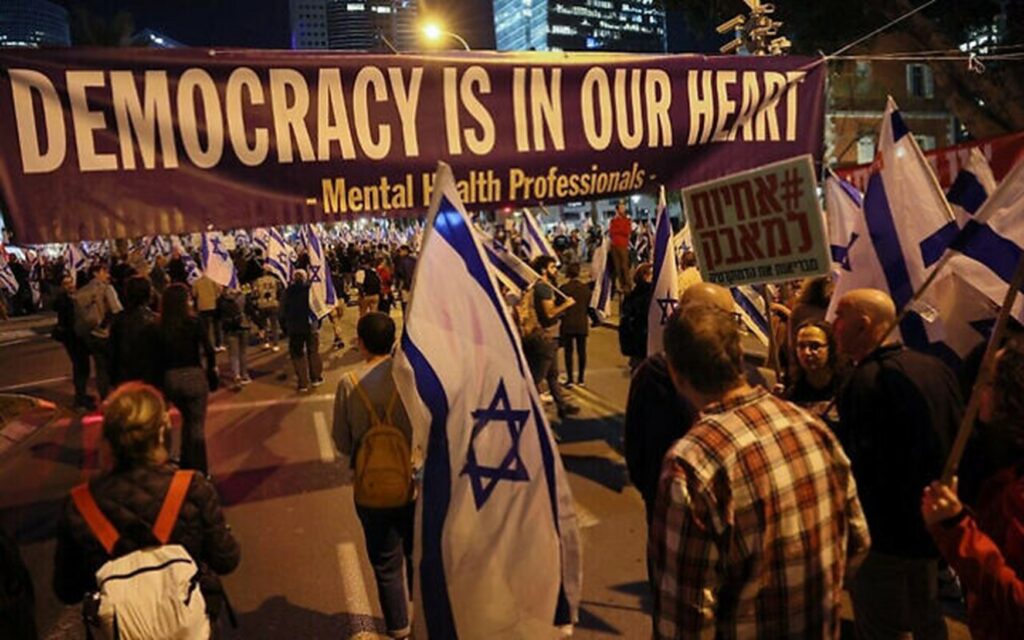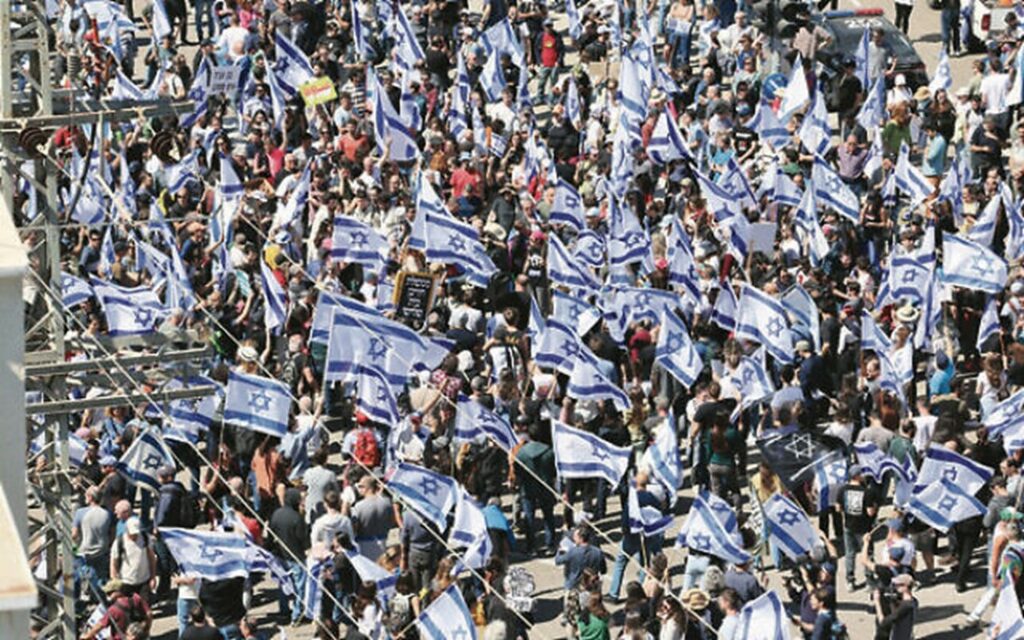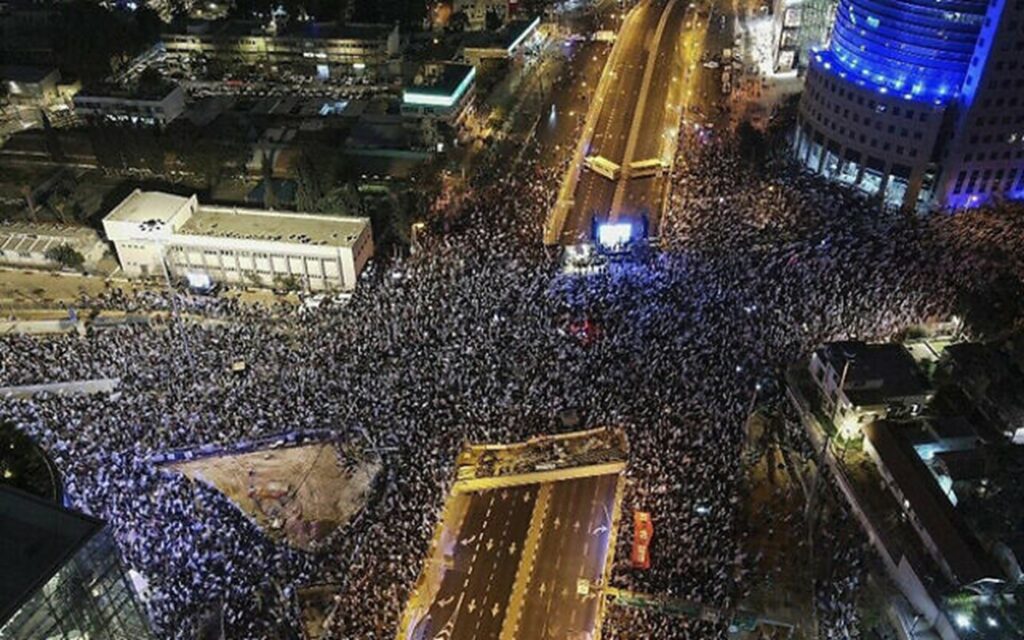
Israel is in the midst of unprecedented political turmoil. Three alarms are sounding:
First, the complexion of the coalition government including the racist policies and disposition of certain extremist leaders and parties is unnerving.
Second, the prospects of a two-state solution could become impossible, through a vast extension of settlements, beyond anything previously considered by Israel, including the displacement of Palestinian populations. This is deeply troubling.
Third, the array of legal so-called ‘reforms’ proposed by the government threatens to unravel the democratic, secular principles that govern the Jewish state. The Likud-led government, representing a narrow majority, never prepared the electorate for the sweeping judicial overhaul now underway.
The continuing demonstrations against the government are emblematic of broad conflicts about justice, the Rule of Law and minority rights, which underpin Israel’s democracy.
The question now is whether Prime Minister Netanyahu’s adroit past political manoeuvrings and judgement is equal to the precarious position he and his new government are now in.
The 37th Government of Israel
Before addressing those issues, a moment on the character of the government.
The 37th government of Israel, the present Cabinet, from six parties, is supported by 64 members (MKs) of the Israeli parliament, the Knesset, out of 120 members: –
Likud, 32 seats, historically, a secular, mainstream conservative party, which over the last decade has shifted more rightward, with support for pro-settler, annexation policies.
Shas, 11 seats, formed in 1984 primarily represents the interests of religious north African-origin (Sephardic) and Arab-origin (Mizrahi) Jews. Since 1984 it has been part of most governing coalitions, whether the ruling party is Likud or from the centre left.
United Torah Judaism, 7 seats. The party was formed in 1992 to maximise European (Ashkenazi) religious (Haredi), non-Zionist representation.
Religious Zionist Party, 7 seats, is a far-right, ultra-nationalist, Jewish supremacist, religious Zionist party.
Otzma Yehudit, “Jewish Power”, 6 seats, is a far-right party, whose origins are Kahanist. This refers to the views of Rabbi Meir Kahane (1932-90), the American-born founder of the Jewish Defence League and Kach party which asserted that Israeli Arabs (about 20% of the population) are the country’s enemies, and proposed a theocratic state, where non-Jews have no voting rights. Kach was banned by the Israeli government. From 2004 to 2022, the US State Department designated it a terrorist organisation.
Noam, 1 seat, is a conservative, far right religious Zionist party, established in 2019, to advance policies against LGBT rights, and against what its backers call “the destruction of the family.”
The Opposition, led by former Prime Minister Yair Lapid, has 51 seats, with most of the rest of the MKs coming from the Arab parties, one bloc of whom, led by Mansour Abbas, leader of the United Arab List or Raam, was part of the former governing coalition.
Under Israel’s proportional representation system, to be represented in the Knesset from national, direct, equal, secret, and proportional elections, this requires a voting list or party grouping to pass the qualifying electoral threshold, currently at 3.25%. Where a list fails to reach the threshold, its votes are wasted.
In elections held on 1 November 2022, of 6,788,804 total eligible voters, 4,794,593 voted, a 70.63% turnout, with 0.62% invalid or spoiled ballot papers. Of the political groupings that failed to cross the threshold, the largest were Meretz, a left-wing party (to the left of the Israeli Labour Party) who obtained 3.16% of the vote, and Balad, an Arab party, which received 2.91%. Had they coalesced with, say, Israeli Labour and the Arab List, respectively, their combined over 6.0% of the vote would have yielded seats to the Opposition, making the election result extremely close.
Politically, Israeli society is evenly divided. At the election, the votes of right wing and religious Israelis were maximised. Netanyahu used his persuasive powers to ensure that the two far right parties, Religious Zionism and Otzma Yehudit, ran together on a joint slate. Noam only secured its single seat by also joining this list on the ballot paper.
The anti-Netanyahu camp was clueless by comparison. Of the political groupings that failed to cross the electoral threshold, the largest were Meretz, a left-wing party (to the left of the Israeli Labour Party) who obtained 3.16% of the vote, and Balad, an Arab party, which received 2.91%.
Despite repeated warnings, the leader of the Israeli Labour Party adamantly refused to entertain a joint electoral ticket with Meretz. The consequences were foreseeable. Meretz slipped below the quota and is now absent from the Knesset for the first time in its 30-year history. Balad split from the majority-Arab Joint List to run on its own, with no realistic prospect of reaching the 3.25% threshold.
Ultimately 150 000 Meretz votes and 138 000 Balad votes were wasted. Key figures in the anti-Netanyahu bloc have only themselves to blame. The narcissism of small differences handed the election to the right wing and religious bloc.
Problems with Smotrich & Ben-Gvir and the Religious Parties
Several ‘hot head’ Cabinet Ministers are causing a great deal of trouble for Israel internally, within the Jewish diaspora, and internationally.
They are Bezalel Smotrich of the Religious Zionist Party, Minister of Finance, and adjunct minister in the Ministry of Defence; Itamar Ben-Gvir of Otzma Yehudit, the Minister of National Security; and to a lesser extent, Avi Maoz, of Noam, Deputy Minister in the Prime Minister’s Office, responsible for external programs in the Ministry of Education.
Smotrich negotiated broad authority over civilian issues in the West Bank, enabling him to potentially deepen Israel’s presence there, increase settlement construction and thwart Palestinian development. His powers, secured through coalition negotiations, include enforcement powers over illegal construction, authority over planning and construction for settlements, and land allocation matters.
Smotrich’s theocratic agenda, his intolerant views on Arabs, his hostility to non-Orthodox streams of Judaism, always meant that he would be a controversial political figure. Would he grow to maturity in government? An indication came after a Palestinian terrorist gunned down two Jewish Israeli brothers caught in traffic in the Palestinian town. On 26 February 2023 hundreds of Israeli settlers went on a violent late-night rampage in Huwara and other Palestinian towns as a revenge attack. Smotrich called for the government to “wipe out” Huwara. Ben-Gvir ‘liked’ a tweet to that effect by Smotrich. Later, however, Smotrich clarified that he thought the village should not be wiped out by civilians – but by the military. Then he backtracked further.
Ben-Gvir, in charge of the police, is feuding with the military and the security establishment. The latter see him as a professional provocateur, who has stirred communal tensions throughout his political career, including through several visits to the Temple Mount where the al-Aqsa Mosque is located. The new Minister of National Security was never allowed to join the Israel Defence Forces (IDF) because of his radical anti-Arab views; he was convicted of racist incitement against Arabs and for supporting Kach. He was infamously interviewed in his home on whose wall hung a picture of Baruch Goldstein, the Jewish terrorist who in 1994 with an automatic rifle murdered 29 Muslims at prayer and wounded 125 at the Cave of the Patriarchs. On 3 January 2023, Ben-Gvir again visited the Temple Mount, as security minister, in violation of a military exclusion zone, which spurred an international wave of criticism.
These two ministers lack the temperament to lead constructively and responsibly.
Alarmingly, on 14 March 50 MKs, including ministers, demanded that the defence minister release from administrative detention two settler extremists held for their suspected roles in the vigilante rampage in Huwara.
In contrast, Shas and United Torah Judaism are parties more interested in de-secularising Israel, piously campaigning for extra religious funding for yeshivas and synagogues, exemptions from army service for religious Jews, and a myriad of symbolic and impactful intrusions on what has been normal life in Israel.
The alliance of the religious parties means that they have half the government, 32 MKs, the same as Likud.
Shas leader Aryeh Deri, under the coalition agreement with Likud, was due to become health and interior minister. After the second year of government, he was to switch and take over as finance minister from Smotrich. Deri was to serve as deputy prime minster throughout the government’s entire four-year-term. Interestingly, Deri served as interior minister in Labour Prime Minister Yitzhak Rabin’s second government (1992-1993) when the Oslo Accords were signed. With considerable experience, and a deep understanding of diplomatic and security affairs, he is regarded as a relatively moderate figure.
Yet, in January 2023 Deri was sentenced to probation for tax fraud following a plea deal. According to Israel’s Basic Law (on which more below), someone so convicted must wait seven years before being allowed to serve in a ministerial capacity. Because of this, Shas and Likud agreed to amend the law allowing Deri to serve.
Defence Minister Yoav Gallant, from Likud, worries that Israel’s ongoing internal unrest, the falling popularity of the Palestinian Authority, a rise in nationalist Jewish attacks and the actions of Ben Gvir, contribute to a highly volatile state in the West Bank.
Behind closed doors, mostly, Ben Gvir has brawled with the prime minister, top police officials, and military chiefs. He ordered the demolition of ‘illegal’ construction in East Jerusalem by Palestinian families (built without permits from Israel.) The timing was deaf and dumb to potential security consequences. Adding to frictions, he framed the demolition policy as part of Israel’s efforts to combat Palestinian terror. Yet there is no evidence of links between the owners of homes razed for a lack of permit in recent weeks and security offenses.
Sadly, Palestinian terror attacks in Israel and the West Bank this year have already left 15 Israelis dead and several more seriously hurt. At least 84 Palestinians have been killed by the IDF since the beginning of the year, most of them while carrying out attacks or during clashes with security forces, but some were uninvolved civilians and others were killed under circumstances that remain under investigation.
Legal ‘Reforms’
David Ben-Gurion read aloud these words on the day of Israel’s Declaration of Independence on 14 May 1948:
“The state of Israel will be open for Jewish immigration and for the Ingathering of the Exiles; it will foster the development of the country for the benefit of all its inhabitants; it will be based on freedom, justice and peace as envisaged by the prophets of Israel; it will ensure complete equality of social and political rights to all its inhabitants irrespective of religion, race or sex; it will guarantee freedom of religion, conscience, language, education and culture.”
Though without a written Constitution, Israel is governed by the Basic Law, which enshrines key principles informed by those words, and as interpreted by the Israel Supreme Court.
The government’s proposed legal changes are a hodge podge.
They include legislation to circumvent any corruption trial of any Prime Minister while in office, legislation to enable Shas MK Deri to serve in government, and legislation affecting the Supreme Court. The latter includes proposals that politicise judicial appointments (solely through government appointment) and legislation to enable the Knesset by simple majority to override Supreme Court decisions.
The deadline the government has set for the more revolutionary changes is the end of March.
The motivating fear of opponents is that any such legislation could shatter Israel’s foundational principles, proudly asserted in the Declaration of Independence, as a tolerant Jewish and democratic state committed to equality and personal freedoms. Is this a legitimate fear? Yes. Smotrich has said that he supports allowing business owners to turn away customers if serving them conflicts with their religious beliefs. Critics say this could permit a hospital to withhold bread from an Israeli Arab during Passover. “What comes next?” is a catchcry that invites alarm. With extremist ministers at the helm, future changes could undermine the very character of the country Ben-Gurion envisioned.
Should the Supreme Court strike down particular legislation, and the government then decides to make the court ruling null and void, in the interregnum, the IDF, Shin Bet, the police, and citizens could be in an invidious position, in nothing less than a constitutional crisis.
In the past few months, thousands of decorated soldiers, pilots, former Mossad directors, retired generals, cyber security units, publicly voiced concerns about upcoming legal ‘reforms’. Many have refused to show up for reserve duty. Hundreds have turned up and refused training on the day. Last week, 37 of 40 reserve F-15 pilots from the IAF’s famed 69th Squadron, known as the Hammers, announced their boycott of one day of training in protest.
Another proposed law change concerns the hametz (leavened bread) rule, which would require hospitals to prevent people from bringing hametz into the hospital during Passover.
Under the Conscription Law, every 18-year-old must serve in the IDF. Myriad exemptions apply to religious Jews who can delay their army service to study in a yeshiva. Exemptions also apply to Israeli Arabs who often carry a dual identity of Palestinian and Israeli.
The IDF prides itself as the melting pot of Israeli society. Yet, many of the ultra-Orthodox seek to rewrite the law in such a way that would automatically exempt thousands of yeshiva students from military service. This is a very sore point. In 2017, the Supreme Court struck down a 2015 law passed by the then right-wing government that largely exempted yeshiva students. The Court struck it down on the basis that the law failed to treat citizens equally. The current government’s proposals would enable a simple majority of Knesset members to cast aside this judicial decision.
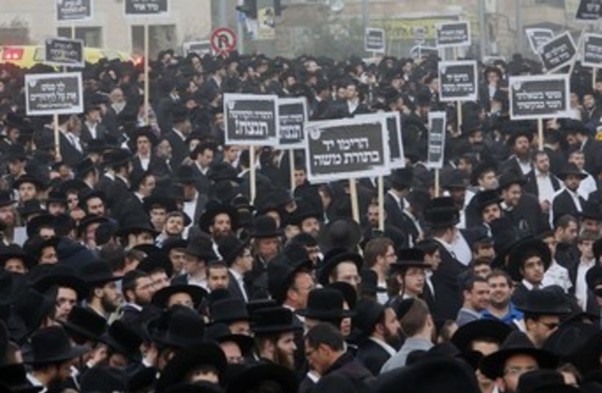
President Isaac Herzog has called for compromises, negotiations, consensus. He is urging the government to engage in dialogue, deliberate again, and consider the implications for national security and national unity. But so far, his pleas remain mostly unheeded.
The Jews of the Diaspora, who look to Israel as a source of pride, as a potential home and potentially as an essential refuge, are in ferment. Ben-Gvir oft-stated belief that the state should cease recognition of conversions carried out by the Reform movement is alarming. Israel’s 1950 Law of Return enshrines the right of all Jews to obtain Israeli citizenship. In 1970, the last time the law was amended, the Knesset extended immigration rights to people with one Jewish grandparent and the same rights to that individual’s spouse and children. This is under review. Of the over 7.0 million American Jews, overwhelmingly most are non-Orthodox, with Reform and Conservative predominating.
The current impasse illuminates a deep crisis of the political system itself.
Rogachevsky notes that:
Though arrogating to itself powers of interpretation and perhaps even the authority to cancel Basic Laws, the court had been constrained somewhat for fear of whipping up popular sentiment against it. This is hardly a Madisonian separation of powers. But it constitutes a species of separation of powers all the same.
Significantly, judicial reform was not a major plank of the Likud party before the November 2022 election. Far from preparing the public for major change, Likud and Netanyahu did not prioritise significant constitutional and judicial overhaul. Netanyahu’s reform agenda is due to the effort of an impassioned minority, his coalition partners, to impose its will upon the country.
Harvard constitutional law professor emeritus, Alan Dershowitz argues that the Israeli Supreme Court extended its power over a broad array of issues and might have gone too far in some instances. Yet he too is deeply troubled.
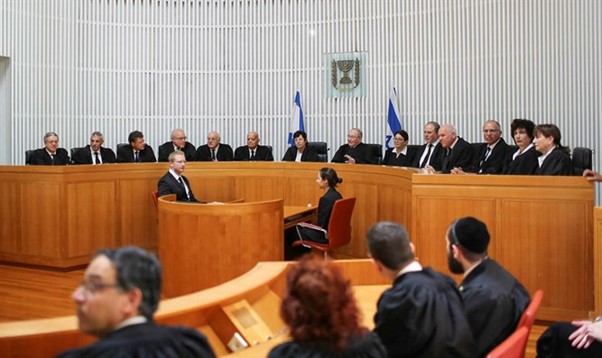
Dershowitz proposes that for decisions regarding basic issues of civil liberties, human rights, minority rights, civil rights, due process, free speech, religious liberty, equal protection and other enduring aspects of individual liberty, the Supreme Court should have the last word. Further, a super-majority, not just a simple majority, of Knesset members should be required for overriding Supreme Court decisions.
He addresses the argument that the current appointment system is a self-perpetuating ‘insider’ elite process, by suggesting a solution. (The Judicial Selection Committee, which proposes to the President of Israel an appointee to the Supreme Court, is composed of nine members: three Supreme Court Judges (including the President of the Supreme Court), two Cabinet Ministers (one of whom is the Minister of Justice), two Knesset members, and two representatives of the Israel Bar Association, where a majority is obtained with at least seven of the nine attending a meeting.)
Notwithstanding the drawbacks, Dershowitz says that to strike a balance, instead of a simple majority of the selecting body for approval of judicial appointments, only consensus candidates with multi-party or non-partisan support should be chosen. The key is to assure that the pendulum does not swing too far from excellence towards partisanship. As the Torah commands judges: lo takir panim – “do not recognise faces (or political parties).”
Significantly, he explains that weakening the standing and independence of the Supreme Court, including demands to override decisions protecting core liberties, invites considerable harm to Israel’s interests. It could weaken Israel’s ability to invoke “the principle of complementarity” as a defence against the claimed jurisdiction of the International Criminal Court over Israel.
Concluding Comments
A confluence of agitating elements worries me.
The Israeli government’s moves to de-fang the Supreme Court, overrule its decisions by a simple Knesset majority, avoid the Netanyahu corruption trial, enable a convicted felon to serve as a minister, consider revoking the right of non-Orthodox Jews to have the ‘right of return’ as Jews to Israel, combined with the attacks and murders by Palestinians of Israelis, the settler violence, the mass demonstrations day after day in major cities, the growing and publicly expressed unease by the diaspora, including in Australia – all of this may culminate in an unprecedented crisis. President Herzog speaks openly of his fear of a civil war erupting.
For the past year, the IDF’s Operation Break the Wave has been aimed at thwarting terrorist attacks. Armed youths in the West Bank attack Israeli settlements, roads, and IDF forces, and shoot at IDF forces and are mostly arrested. Jerusalem continues to be a volatile hotspot. The human toll is mounting.
Annexation of West Bank territory far from Israeli population centres, together with permissive settlement expansion, could destroy any pretence of a two-state solution.
As confidence in Israel’s rule of law and stability ebbs, so too do hopes of widening the circle of regional peace, including with Saudi Arabia. Should the conflict with Palestinians escalate, this could embolden Israel’s enemies to strike.
With the approach of the 30-day Ramadan fast (from 23 March), upcoming holidays (Passover, Israeli Independence Day, and Jerusalem Day; Easter; and the Palestinian Nakba and Naksa), there is a growing assessment that the timber is dry and the sparks could fly.
This time, Netanyahu is bereft of any mainstream allies, unlike all previous coalitions led by him. Netanyahu has usually been at the centre of the political forces that have made up his previous coalition governments. This time, he is on the left flank of a government that is genuinely the most right wing in the nation’s history. In this current coalition government, extremists hold prominent positions, enthused by toxic commentators on TV, radio and social media. It is hard to believe that Netanyahu or his government can survive this. Israel and he are being put to an existential test.
Perhaps some of the more centrist parties despite their revulsion of Netanyahu himself, might relent for the sake of the greater good and join a government of national unity. But there is nothing like that on the immediate horizon. But who knows?
Shimon Peres once observed that Jews in Israel cannot afford the luxury of pessimism. They must choose to be optimistic. Out of the demonstrations and protests, the galvanising of public opinion, there are new faces, new leaders, new voices emerging. The current government would likely fall if fresh elections were held.
Israel is worth defending, even if its government, as presently constituted, is not.
